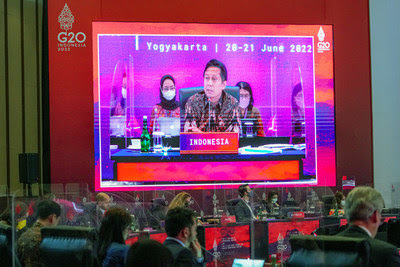YOGYAKARTA, Indonésie, 27 juin 2022 /PRNewswire/ — Les ministres des Finances et de la Santé des 20 plus grandes économies du monde conviennent d’établir un fonds pandémique révolutionnaire pour aider le monde à mieux prévenir, se préparer et répondre aux futures pandémies.

Le ministre indonésien de la Santé, Budi Gunadi Sadikin, et le ministre des Finances, Sri Mulyani Indrawati, ont coprésidé la 1ère réunion conjointe des ministres des Finances et de la Santé du G20 (JFHMM), au cours de laquelle les États membres du G20 ont convenu de la création d’un Fonds intermédiaire financier (FIF) pour la préparation, la prévention et la réponse aux pandémies (PPR), sous la tutelle de la Banque mondiale et les conseils techniques de l’OMS.
« Je suis heureux d’annoncer qu’un engagement de plus de 1,1 milliard de dollars a été obtenu pour le Fonds intermédiaire financier pour la PPR pandémique. » a déclaré le ministre Mulyani. L’Indonésie s’engage à contribuer à hauteur de 50 millions de dollars, Singapour à hauteur de 10 millions de dollars, les États-Unis à hauteur de 450 millions de dollars, l’Union européenne à hauteur de 450 millions de dollars, l’Allemagne à hauteur de 50 millions d’euros (52,7 millions de dollars) et Wellcome Trust à hauteur de 10 millions de livres (12,3 millions de dollars). Les États membres du G20 ont également souligné que le fonds serait inclusif par nature et permettrait aux pays à revenu moyen et faible d’y avoir accès.
La conclusion du JFHMM sera également discutée lors de la prochaine réunion des ministres des Finances et des gouverneurs des banques centrales (FMCBG) le mois prochain et fera l’objet d’un suivi lors de la prochaine réunion du groupe de travail conjoint Finances-Santé (JFHTF).
Le ministre indonésien de la santé, M. Budi, a souligné que le JFHTF du G20 a progressé dans la discussion de l’idée de la création d’un FIF qui a été introduite pour la première fois pendant la présidence italienne du G20 en 2021. « Je suis convaincu que nous obtiendrons des résultats concrets d’ici octobre, ce qui inclut l’établissement de la FIF et la collaboration avec la plateforme de coordination », a déclaré le ministre Budi.
Les deux réunions ont également convenu de la vérification universelle des certificats de vaccination COVID-19, des protocoles sanitaires pour faciliter la mobilité mondiale, et de l’expansion du Centre mondial de fabrication et de recherche pour la PPR, en particulier la production de vaccins, de produits thérapeutiques et de diagnostics devant avoir lieu dans les pays en développement.
Le directeur général de l’OMS, le Dr Tedros Adhanom Ghebreyesus, la Banque mondiale, GAVI, CEPI, le Fonds mondial et la Fondation Bill et Melinda Gates ont assisté à la réunion. Le Dr Tedros a déclaré que la FIF doit également être cohérente avec les autres initiatives mondiales en matière de santé. « Cette plateforme doit s’appuyer sur l’expérience de l’ACT Accelerator, du cadre de lutte contre la grippe pandémique et d’autres mécanismes. Il s’agit d’un axe important du volet santé du G20 sous la direction du ministre Budi », a-t-il déclaré.
Photo – https://mma.prnewswire.com/
